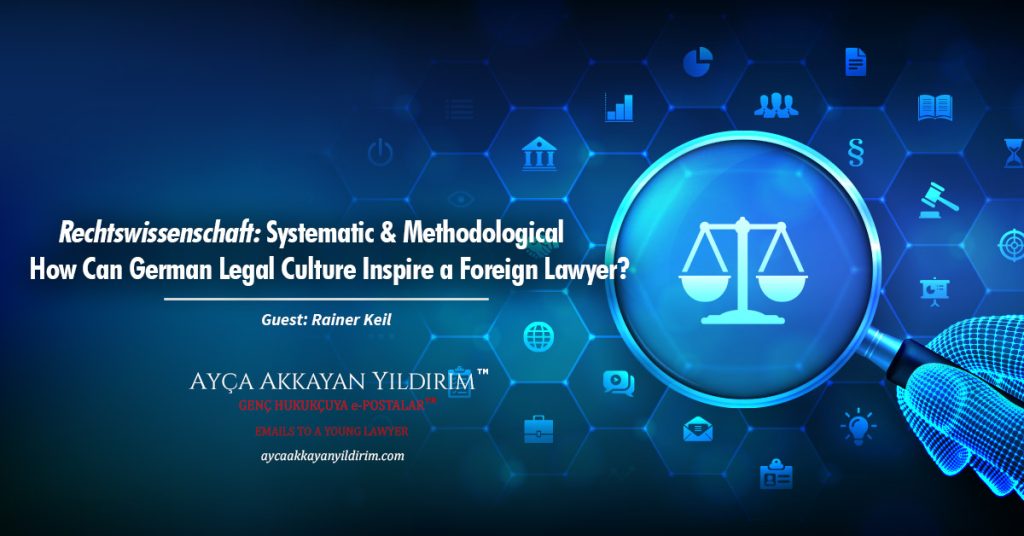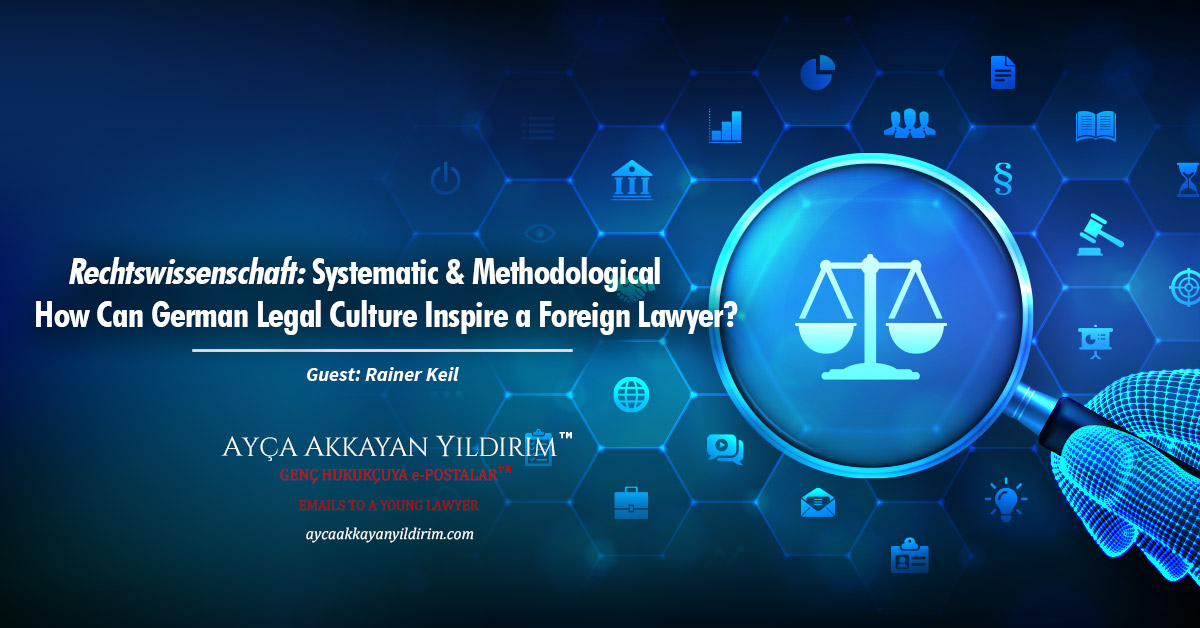Tuesday, October 26, 2021


Date : October 26, 2021
To : Young Lawyers
Re : Rechtswissenschaft: Systematic & Methodological
How Can German Legal Culture Inspire a Foreign Lawyer?
INTERNATIONAL LL.M. PROGRAMS: HEIDELBERG UNIVERSITY FACULTY of LAW, HEIDELBERG, GERMANY
I would like to express my gratitude and appreciation to Dr. Rainer Keil for taking the time to answer my questions. GHK
GHK: Dr. Keil, Heidelberg Law is an internationally renowned institution in legal research and the oldest university in Germany. In an increasingly interdependent world reshaping our profession, what do you think is the value of an international LL.M. from Heidelberg Law or Germany for a graduating law student or lawyer from Turkey?
RK: The study of German and European law within the LL.M. program of the Faculty of Law of Heidelberg University offers international law students a broad variety of valuable opportunities. Germany boasts of a very sophistically developed system of law. In German legal education, there is much emphasis on legal methodology, and these skills prove very helpful also in other legal systems. Numerous parts of German law have served as a model for quite a few foreign jurisdictions. For example, counterparts to the General Part of the German Civil Code can be found in the civil codes of Greece (1946) and Portugal (1966). German criminal law has influenced some countries, most notably Japan. The Turkish Republic basically took the German criminal procedural code as a model. German constitutional law, the review powers, and the rules of procedure of the Federal Constitutional Court have inspired constitutional orders far beyond German borders. The same is true of administrative procedural law. Alongside national legal frameworks, the European Union (EU) laws are becoming ever more important within Europe. Legal professionals who wish to work internationally are required to have a profound command of European law. Owing to its supranational nature, European law forms an integral component of every Member State’s legal system and establishes a distinct layer of law, independent from national and international law. Having been awarded the LL.M. degree in German and European Law bears witness of in-depth knowledge in these fields of law.
GHK: Why should one choose Germany to pursue an LL.M. degree? In particular, what makes attending Heidelberg Law a unique experience?
RK: Germany has strong and vivid relations with Turkey: political bonds, close relations in the spheres of business and economy, family bonds, general cultural exchange, and relations based on holiday traveling. These close ties give rise to legal issues that have to be resolved on the basis of the respective applicable law. We already talked about the German legal culture. Rechtswissenschaft, the systematic, methodological, and, therefore, truly ‘scientific’ way of enquiring into legal problems, might inspire legal cultures in foreign countries. In Heidelberg, international students can delve into the German culture of studying law, share time in (and outside of) lectures with German, European and international students and benefit from the outstanding resources of the Max Planck Institute for Comparative Public Law and International Law besides the nine institutes of the Faculty of Law. In Heidelberg, students are part of a university that has been praised for its excellence and for its comprehensiveness: Renowned institutes in medical science, physics and other natural sciences, theology, languages, philosophy, history, economics, and many other fields offer a truly inspiring environment; interdisciplinary seminars, public presentations, speeches, discussions thus come about – of course, currently somewhat reduced owing to the limitations imposed by the Covid19 pandemic and the measures to curb it.
GHK: Could you please explain the weight or emphasis given to each part of a student’s application, such as GPA, language score, a letter of motivation, and letters of recommendation? How should an applicant from Turkey address a low GPA in an LL.M. application to the Heidelberg Law?
RK: Two things are important for the success of an application for admission to the LL.M. program in German and European law: Excellent German language skills (DSH-3 or equivalent) and successful completion of previous studies in law outside of Germany recognized as equivalent to undergraduate studies having led to the German First State Examination in Law. For this equivalence aspects as the following are important:
- The undergraduate program or other previous program in law was offered by a recognized university law school within a study program designed for at least 4 years of studies before the final examination;
- This first program comprised a sufficient number of academic studies of all major fields of law, including private law, criminal law, public law, some procedural law and some of such foundational subjects such as legal history, philosophy of law or jurisprudence, legal methodology or comparative law.
GHK: Applicants often have difficulty choosing and approaching potential recommenders. Could you offer any general advice regarding letters of recommendation? Who would be the best person to write an LL.M. applicant’s recommendation letter?
RK: Letters of recommendation are neither necessary nor even helpful for an application for this program – the German university culture is here simply different from the Anglo-Saxon culture.
GHK: What do you look for in a letter of motivation? Can you offer applicants from Turkey any advice regarding writing the letter of motivation?
RK: Letters of motivation are very important for applications for admission to undergraduate studies – but presently not for the LL.M. program in German and European Law.
GHK: The language of instruction in most study courses at Heidelberg University appears to be German. For those looking for an LL.M. program taught in English, are there any LL.M. programs taught or courses offered in English at Heidelberg Law?
RK: There is another LL.M. program that might be considered: The Master’s degree program in International Law is offered by the Faculties of Law at Heidelberg University, Germany and the University of Chile, with academic support from the Max Planck Institute for Comparative Public Law and International Law. Courses are taught in English or Spanish and are held in Santiago de Chile and in Heidelberg. This Master in International Law degree program also attracts students from countries around the world, providing them with the opportunity to become part of a truly international network. For more information one might consider visiting our website.
GHK: It is a widespread understanding that German state universities do not charge any tuition fees. Is tuition fee-free for the LL.M. programs in Heidelberg Law for international students, including a non-European applicant from Turkey? What are the other fees such as administrative costs, semester ticket costs, and the like that a non-European applicant from Turkey must pay for?
RK: The tuition fee amounts to 500 € per semester (9 September 2021). Additional fees change from time to time. Their amount has so far always been below 200 € and can be found on our website.
GHK: Being a non-European applicant from Turkey, how would one find suitable scholarships for studying in Germany and, in particular, Heidelberg Law?
RK: Usually it is good idea to contact or have a look at the homepage of Deutscher Akademischer Austauschdienst (DAAD). Furthermore, sites such as Bundesministerium für Bildung und Forschung and StipendiumPlus might be helpful. Additionally, one might think about checking search engines (though usually in German). Stipendienlotse is among them is for example.
GHK: What are the job opportunities for a non-European in Germany or Europe who has earned an international LL.M. from Heidelberg Law? What should international LL.M. graduates do to increase their chances of recruitment after graduation?
RK: Working as a legal expert is highly regulated in the Federal Republic of Germany. Only persons who have completed a German-regulated legal education with the First Examination in Law and the Second State Examination in Law can work as judges or as the German equivalent of American attorneys or British barristers: Rechtsanwalt or Rechtsanwältin. Rare cases of admission within EU law still rather have to be considered as exceptions and are the result of successful completion of paths that are not open for lawyers from outside the European Union. The LL.M. program does not open up the path to such professions in Germany. It is meant as an additional qualification rather than as the sole key to access to a certain legal profession. The degree is counted as a master’s degree and thus as a degree on level 7 of the International Standard Classification of Education (ISCED) of 2011. It might be possible to apply to professions not specifically regulated and for which an academic degree on that level is necessary. If they fulfill certain prerequisites, persons admitted to the bar in a member state of the World Trade Organization can apply for additional admission to a German chamber of attorneys (Rechtsanwaltskammer) for practicing law, though limited to the law of the state of origin and of primary admission to the bar. Sections 206 and 207 of Bundesrechtsanwaltsordnung regulate details; information has to be obtained from the chambers of attorneys which are organized within Bundesrechtsanwaltskammer.
GHK: Thank you for taking the time to speak with us, Dr. Keil. Anything you would like to add for the Turkish law graduates reading this article?
RK: Thank you for your time and for including us into your publication!
